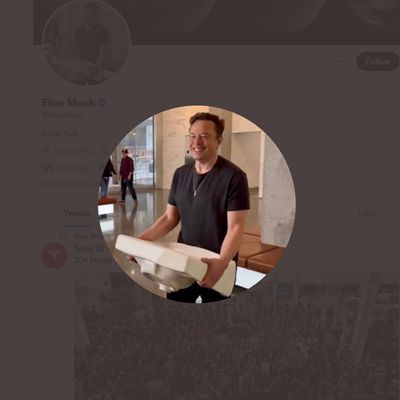
Billionaire and newly minted social-media mogul Elon Musk changed his Twitter bio to “Chief Twit” after taking control of the company on Thursday. On Sunday, he offered a fresh demonstration of why it wasn’t just a play on words.
At 5:15 in the morning, the new Twitter owner posted a tweet sharing a baseless conspiracy theory about the attack on Paul Pelosi, Speaker of the House Nancy Pelosi’s husband, on Friday. Musk was replying to a tweet Hillary Clinton had posted about the attack linking the violence to how “The Republican Party and its mouthpieces now regularly spread hate and deranged conspiracy theories.” Though his motive has not yet been confirmed, the 42-year-old assailant, David DePape, had reportedly expressed far-right and racist views and promoted delusional conspiracy theories online, and may have been specifically targeting the Speaker and her husband.
Musk, who has 112 million followers, replied to Clinton that “there is a tiny possibility there might be more to this story than meets the eye” — then shared a post from a disreputable news site promoting a right-wing conspiracy theory that Mr. Pelosi knew his attacker. Musk’s tweet was deleted several hours later, but not before it was retweeted more than 30,000 times and had received more than 110,000 likes, according to the San Francisco Chronicle.
The article Musk shared was from the Santa Monica Observer, which the misinformation-tracking firm Newsguard has rated “anything but trustworthy” and the Los Angeles Times editorial board last year noted “is notorious for publishing false news”:
In 2016, for example, it claimed that Hillary Clinton had died and that a body double had been sent to debate Donald Trump. Months later it reported, incorrectly, that Trump had appointed Kanye West to a high-level position in the Interior Department. Last year, it reported falsely that sunlight could be a remedy for COVID-19 sufferers and that Bill Gates, a major funder of vaccine research, had been responsible for a polio epidemic.
It is, in other words, exactly the kind of website a billionaire “free-speech absolutist” who routinely stirs controversy by tweeting bizarre nonsense would link out to. And now he owns the tweeting press. Some users replying to Musk’s tweet said they had reported it to Twitter, but the company has not yet responded to media inquiries about what happened after. On Sunday night, Musk tweeted a fake news joke about the controversy:
The Santa Monica Observer website was periodically inaccessible for much of Sunday, likely an indication of how much traffic it got because of Musk’s tweet. The post he linked to claimed that Mr. Pelosi was drunk and had gotten into a fight with a male prostitute — a right-wing conspiracy theory that has emerged in the aftermath of the attack, as the Chronicle explains:
Far-right commentators, and the article promoted by Musk, have seized on an audio recording of a San Francisco dispatcher relaying information about the intruder from Paul Pelosi, who called 911. The dispatcher said the caller “stated that he doesn’t know who the male is but he advised that his name is David and that he is a friend.”
The dispatcher was relaying that DePape — not Paul Pelosi — had “advised that his name is David and that he is a friend.”
The New York Times reported Sunday that San Francisco district attorney Brooke Jenkins “said she had seen nothing to support the idea that Mr. Pelosi and the attacker knew each other.”
Musk has had an eventful first few days at Twitter’s helm. He quickly laid off several top executives (whose “golden parachutes” will land them more than $120 million); confirmed he was taking the company private; and tweeted that “the bird is freed” and “let the good times roll.” Thousands of additional layoffs are expected imminently.
The consequences of this new “bird is freed” era for Twitter and its users (and the world) are far from clear. That is particularly true when it comes to the site’s content-moderation practices, or the potential unbanning of Twitter users who had been barred by the previous regime for offenses like posting hate speech, advocating violence, promoting harmful conspiracy theories, or — in the case of one former president — attempting to subvert America’s democracy. On Friday, Musk tried to reassure Twitter advertisers (who are currently the company’s primary source of revenue) that the platform “obviously cannot become a free-for-all hellscape, where anything can be said with no consequences!”
This post has been updated.































